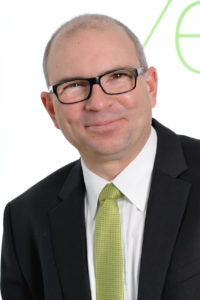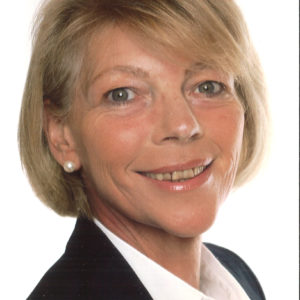This is a guest post by Univ.-Prof. Dr.-Ing. Markus Zdrallek. The guest post reflects the opinion of the author and does not necessarily represent the opinion of the VDE.
Interview with Univ.-Prof. Dr.-Ing. Markus Zdrallek
Oleniczak: Professor Zdrallek, what will the future energy system look like and which role will energy storage facilities take in this context?
Zdrallek: The future energy system will be a completely carbon-neutral and renewable system based on regeneratively produced electricity from wind power, hydropower and photovoltaics as well as hydrogen.
However, it is only possible to temporarily store electric energy in the gas distribution system, in form of hydrogen or in chemical form. Therefore, both components need to be implied in the future energy system. There will be no all-electric world since we do not have sufficient storage capacities in the electricity system to store the energy that has been produced during the summer for the period of winter.
However, we do have numerous options for short-term storage, i.e. battery storage systems, transportable batteries in electric vehicles or pumped‑storage hydropower plants. For long-term or seasonal storage, the only option I see is the chemical option. This is where hydrogen clearly emerges as a storage medium, which we will generate with green power, as far as possible. In Germany, however, we will not succeed in generating all the energy that is needed across the country. Even with the future energy system, we will depend on energy imports.
Today, more than 85 % of energy is mainly imported in form of petroleum or natural gas. Accordingly, we will be required to import regenerative hydrogen in the future, much likely from sunny countries where green hydrogen can be generated at much lower costs than here in Germany. To be able to completely generate the necessary amount of energy here in Germany, we would need to install much more wind power plants and photovoltaic systems. This is something we will not accomplish, because at some point the population’s acceptance limit will be reached.
In the long term, Green Hydrogen is the Future Energy supplier and ultimate Storage Technology
Zdrallek: One important advantage is that, in Germany, we have the capacity to generate hydrogen. This requires the generation of renewable electricity in excess. Additionally, we can utilize most of the already existing natural gas infrastructure for the transport of hydrogen. We just need to reconfigure the system step by step. The first steps have been taken, but we are not yet as far along as we are with the energy transition concerning electricity.
Oleniczak: Again and again, public discussions point out that the generation of hydrogen will release climate-wrecking emissions. What is your position on this theory?
Zdrallek: Of course, green hydrogen will be used in a completely carbon-neutral and renewable system. But this can hardly be achieved before 2050 or 2055. During the transition phase, we will be dependent on blue, grey or otherwise colored hydrogen. There is a variety of colors where each color implies a certain method of generation. Hydrogen will be so important because its import is that easy.
Therefore, my colleague Moser from Aachen, Germany, has set up a simple rule of three: If you sum up our annual total final energy consumption per today, i.e. electricity, driving, heating and so on, it equals about 2 500 terawatt-hours. That is an unimaginably large amount of electricity! The boldest predictions regarding the exploitation of renewable energies such as wind and photovoltaics in Germany are 1 000 terawatt-hours. The conclusion is: We need 2 500 terawatt-hours, 1 000 terawatt-hours of which we are able to produce in our own country. An autonomous generation of 1 000 terawatt-hours entirely in our own country means we need to generate four times as much as we do today. Through improvements in efficiency, we can curb our consumption to 2 000 terawatt-hours. This, however, still leaves a gap of 1 000 terawatt-hours. This makes it clear that we will still depend on imported energy in the future.
Energy Transition is a Marathon, "The German Way of Energy Transition" has become a Blueprint and Trademark abroad
Oleniczak: Does this mean that in terms of energy transition we are not running a sprint but rather a marathon?
Zdrallek: This is correct. Energy transition is a marathon, a fact that is often ignored in political and public discussions. I understand the young people who go out onto the streets on Fridays trying to push the energy transition, and who say that we have to stop the climate change much faster than we are doing at the moment. But you also have to notice that huge step we have taken in the past fifteen years for which we have seriously been dealing with the energy transition.
Let’s take the electricity system: Fifteen years ago, we were at five per cent renewable electricity, now we are at almost fifty per cent. The changeover to renewable energies happens, of course, still not fast enough. Regarding this fact, I understand the young people. But we have already accomplished a lot. This is not only a question of political decisions. It is also about solving technical problems concerning energy storage and electricity grid expansion. This cannot be done overnight.
Oleniczak: In your opinion, what are the major misconceptions of energy transition?
Zdrallek: We have just briefly talked about one major misconception. If you follow the public discussion, you come to the conclusion that not much has happened and that we need to accomplish much more. This is not correct: The government and the energy suppliers have achieved a lot. Fifteen years ago, we were at five percent, today we have a fifty percent share of renewable energy in electricity consumption. But of course, we need to invest even more and we need to become faster in this second phase of energy transition.
The fact that this energy transition is better than its reputation has been understood abroad: Many people look at Germany with optimism. Before the Coronavirus crisis, I often attended international meetings and congresses. China and the large emerging markets such as India and Brazil were very interested in the progresses taking place in Germany. They assumed that if it worked out in highly industrialized Germany, it can be a blueprint for their countries, too. In the English‑speaking world, this was even given the name “the German Energiewende”.
Another misconception concerning energy transition is that it is only driven by climate protection – this is, despite everything, of special importance. Also, the consumption of resources is an important reason for energy transition. Our resources are finite. The organization Club of Rome was already aware of this in the 1960s. Our oil and gas reserves will last for another 50 to 60 years at the most, our coal reserves will only last for a little longer.
Further Expanding Germany's Leading Position
Oleniczak: Where do you see Germany in the international ranking? How can every single person contribute to carefully handle nature and resources?
Zdrallek: As already mentioned, the German energy transition is much better rated around the world than here in Germany. But other countries are catching up, for example, regarding the expansion of renewable energies. Meanwhile, Italy and Spain have much higher expansion rates in photovoltaics than we do. But of course, these countries are much sunnier than our location here in Wuppertal, Germany. But still, as regards the restructuring of the energy supply system, we are far ahead in Germany. We need to stay at this leading position. Here, politics in particular has a responsibility. Meanwhile, almost all parties have agreed on the goals to be achieved.
Now, let us talk about what every single person can do. You need to question your own habits. Let me elaborate this a little. At my chair, we have been working intensively on grid planning in the context of electromobility; this topic is highly important for many electricity grid operators. The question of concern is: How will electromobility affect my grid? Extensive studies have been conducted concerning the mobility behavior of the Germans. In several statistics it has been found that 25 % of all trips made by car are shorter than 1,5 km, which is an astonishing but also shocking fact to me. A small but first step would be to use the bike or e-bike when going to the bakery or to meet with friends to play soccer, as I will do tonight.
Photovoltaic systems are another point to talk about. Even though financial promotion is being cut back, they are now gaining more and more economic viability. In the past, it was only possible to have them installed on south-side roofs, but today also east-side and west-side roofs can be used for installation, because the efficiency of the photovoltaic cells has strongly increased. This is also a point to start with, especially since financial institutions are providing attractive financing offers.
The third point is buying an electric car which, however, is still tainted by personal doubts. Combining this car with a photovoltaic system and a storage facility will additionally raise the sustainability level significantly.
So, everyone can do a lot. It’s about becoming active. Actions speak louder than words.
Oleniczak: Professor Zdrallek, thank you very much for your time, for the various interesting explanations regarding energy and energy transformation and for the outlook into the future.
Author information

Univ.-Prof. Dr.-Ing. Markus Zdrallek is an expert for energy supply technology.
From 2000 to 2010, Prof. Zdrallek held various management positions at the energy supply company RWE in Siegen, Brauweiler, Neuss (Germany) and in Warsaw – most recently as authorised signatory of RWE Rhein-Ruhr Netzservice GmbH.
Since April 2010, he has been a professor at the University of Wuppertal where he is Head of the Chair Electrical Power Supply Engineering. At the same time, Prof. Zdrallek is the scientific director of the company Neue Effizienz – Bergische Gesellschaft für Ressourceneffizienz mbH.
